Which milk substitute is best?
Now comes the hard part – you’ve weighed up your options and decided to go dairy-free. Great! Unlike years ago, there’s certainly a good variety of milk substitutes to choose from. However this new scope of choice can also be a bit overwhelming. Where should you start? What non-dairy milk is right for you?
Ultimately, that is determined by your own goals and preference. Today I’m simply here to provide you with a guide to the 5 most common dairy-free milks by analysing their nutritional value, taste and affordability, offering you options and advising how you can incorporate each of them into a range of different recipes!
Soy Milk
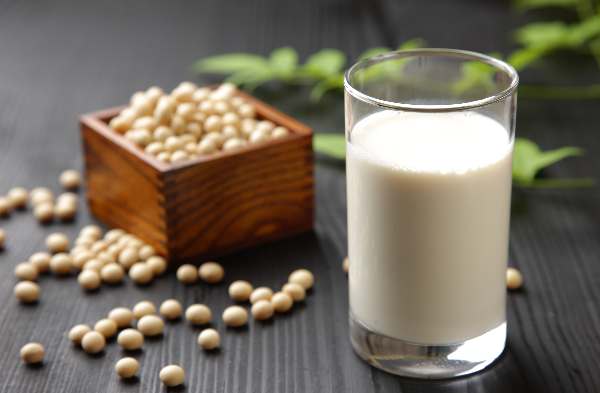
Soy milk has been a staple in the non-dairy scene for decades but, in Asia, this milk is old news as people in China and Japan have been drinking soy milk for centuries, even fermenting the soy beans for popular foods such as miso and tempeh.
As a milk alternative, soy milk is a strong choice. It’s low in saturated fats, which is great if you’re trying to lose weight and it has absolutely no cholesterol.
Per serving, it contains approximately 97 calories compared to semi-skimmed milk which sits at around 115 calories. Soy milk also has an advantage over other non-dairy milks because of its protein content, which is very similar to cow’s milk with an estimated 6g per serving. This definitely makes it a good choice if you are vegan or vegetarian.
Finally, soy milk also contains a respectable level of vitamin K, B vitamins and folate.
The downside: The downside of soy milk is that, similarly to milk, soy is considered to be a major allergen for some. It also can’t compete with milk when it comes to calcium and contains isoflavones. Isoflavones are a type of phytochemical that can behave very similarly to oestrogen, which is why we include it in our Menopause Support product. However, the presence of isoflavones does concern men, as we explore in our blog, Is soya milk safe for men to drink?
Is soy 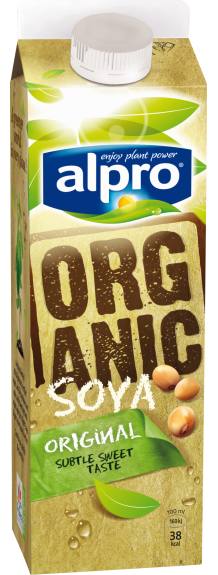 milk is right for me? This can depend on your own preferences. Soy milk does have a subtle flavour that’s easy to disguise when added to other ingredients, however, sometimes it can also have a slight marmite affect, with some loving the taste and others hating it.
milk is right for me? This can depend on your own preferences. Soy milk does have a subtle flavour that’s easy to disguise when added to other ingredients, however, sometimes it can also have a slight marmite affect, with some loving the taste and others hating it.
However, soy is a good option if you’re vegan or vegetarian and it can be fortified with certain vitamins and nutrients. It also wins points for affordability, being slightly cheaper than other dairy alternatives. If you are going to try soy milk, try to go for an unsweetened, organic brand. Alpro’s Organic Soya Milk is ethically sourced and gluten-free.
My favourite recipe:
Chocolate Coconut Overnight Oats
Almond Milk
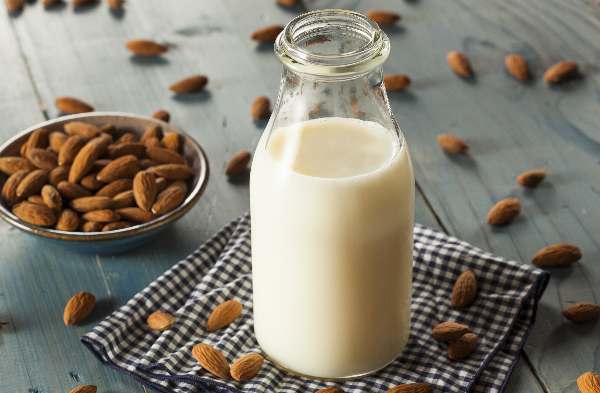
Almond milk might seem like a trendy fad but this nut milk has been a dairy-free alternative for years, especially during medieval times due to its comparatively longer lifespan. Now it’s back in fashion and people are even trying to invent their own almond milk recipes!
This is with good reason – almond milk is naturally nourishing and rich in vitamins and minerals, especially vitamin E and mood-boosting magnesium!
Just one cup of unsweetened almond milk provides 40 calories1, making it lower than both soy milk and dairy milk. It contains no saturated fats and almost 50% of your daily allowance of vitamin E. It also has little to no impact on your blood sugar levels and is rich in healthy fats.
The downside: While almond milk may be lower in fat than both soy and dairy, it also does not contain nearly as much protein, with about 1 gram per serving. This could be risky if you’re vegan or vegetarian, not to mention that almond milk has a lower calcium content. Almond milk may also contain an abundance of tyrosine, which can affect your levels of thyroid hormones.2
Is almond milk right for me? Providing you are getting an adequate source of protein from other areas of your diet, almond milk is a good choice. Unlike rice milk, it boasts an appealingly creamy, nutty flavour that makes it popular as a drink in its own right.
What you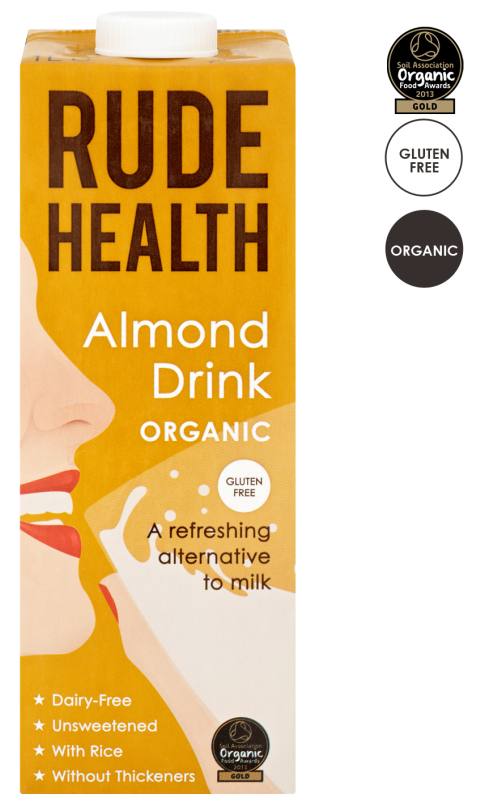 do have to watch out for is the additives being added to commercial brands, which can include a thickener known as ‘carrageenan.’ Carrageenan can cause digestive upsets so it’s best to stick to an organic brand.
do have to watch out for is the additives being added to commercial brands, which can include a thickener known as ‘carrageenan.’ Carrageenan can cause digestive upsets so it’s best to stick to an organic brand.
My favourite brand of almond milk is definitely Rude Health’s Almond Milk. It may be slightly pricier than other supermarket brands, but you can’t argue with the taste or the ethics. It’s got a delightfully creamy flavour and contains no added sugars or gluten.
My favourite recipe:
Banana Pancakes with Homemade Chocolate Sauce
1http://www.healthline.com/health/milk-almond-cow-soy-rice#Almondmilk3
2http://superhumancoach.com/negative-effects-of-almond-milk/
Coconut Milk
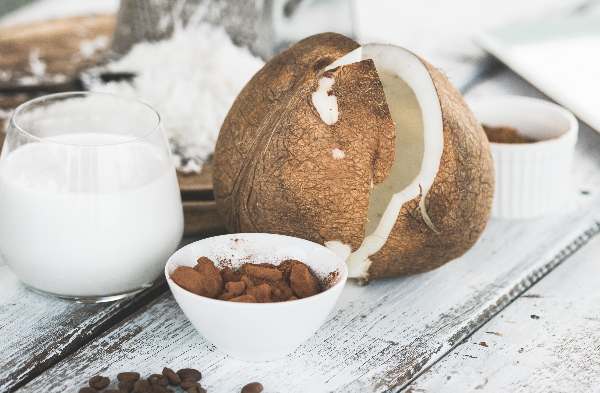
Coconuts have been the lifeblood of the Polynesian islands for centuries but now they’re gaining a reputation in the West, and it’s one that’s well earned!
Coconut milk is rich in healthy fats and medium chain fatty acids, including lauric acid. This is important if you plan on working out, as lauric acid can be used by the body as an energy source. Coconut milk also helps to provide valuable electrolytes, which are essential for retaining fluid and relieving fatigue.
Definitely a milk for fitness fanatics then! That’s not all though – due to its content of electrolytes, it can also help to aid healthy digestion, even relieving some of the symptoms of constipation.3 Not to mention that one cup contains 110% of your recommend daily allowance of manganese!
The downside: While coconut milk does contain healthy fats, it is one of the highest in calories, with just a quarter of a cup providing 138 calories. This means that it’s very easy to drink more coconut milk than you actually need. It’s also rich in saturated fats and some brands are notorious for adding sugars to the product.
Is coconut milk right for me? If you’re planning on working out, undoubtedly coconut milk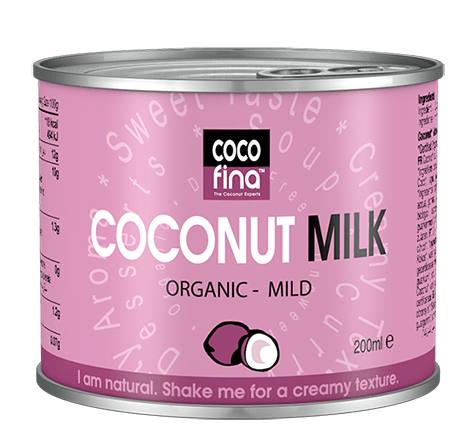 would have some real benefits. However, moderation is important so I wouldn’t go gulping down glass after glass of the stuff, despite how lovely it may taste! Instead, stick to small servings. It’s also worth noting that you’ll have to go the extra mile to make sure no unwanted nasties are being added to your milk by less-than-honest brands.
would have some real benefits. However, moderation is important so I wouldn’t go gulping down glass after glass of the stuff, despite how lovely it may taste! Instead, stick to small servings. It’s also worth noting that you’ll have to go the extra mile to make sure no unwanted nasties are being added to your milk by less-than-honest brands.
In terms of affordability, coconut milk is usually around the same price range as almond milk. If you’re looking for an affordable and ethical brand of coconut milk, it might be worth trying Cocofina’s Organic Coconut Milk. It’s inexpensive and great for adding smoothies or using to whip up vegan ice-cream.
My favourite recipe:
Dairy-free Chocolate, Coconut & Coffee Ice Cream
3https://www.niddk.nih.gov/health-information/digestive-diseases/constipation/treatment
Cashew Milk
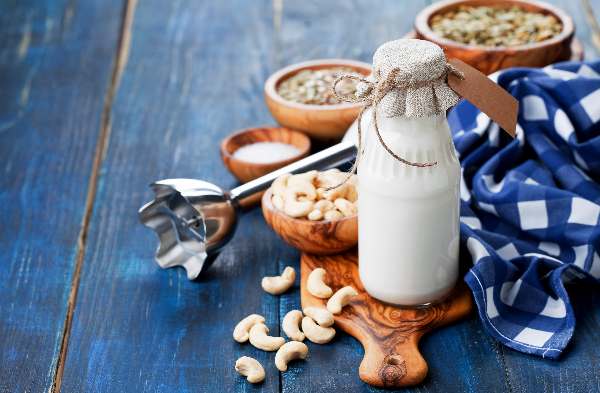
Cashews are originally native to Brazil and their milk is finally making its way into mainstream media, with many now getting tired of the more conventional almond milk and switching to cashew instead.
However, the two are very similar in terms of nutritional value. Both milks are naturally low in fat but have high contents of vitamin E. Cashew milk differs from almond milk slightly, in that it does contain fewer calories, with unsweetened cashew milk containing around 25 calories per glass.
It also has no natural sugars, making it a good choice if you’re trying to keep an eye on your blood sugar levels. It also contains the feel good hormone tryptophan which can boost your production of serotonin.4
The downside: In the same way that it shares a lot of similarities with almond milk, cashew milk also shares many of the same pitfalls. It’s not a good source of protein, unlike soy milk and dairy milk, and even if you decide to make it at home, the calorie count increases dramatically. It’s also quite pricey, even compared to coconut milk and almond milk so it isn’t the most affordable option.
Is cashew milk right for me? If you’re getting tired of the taste of almond milk and want to try something a little bit different, cashew milk is a fair choice. It doesn’t have a strong nutty flavour like almond milk and is slightly sweeter, making it more palatable.
However, despite its benefits, it doesn’t really stand on its own two feet the way that soy milk, almond milk an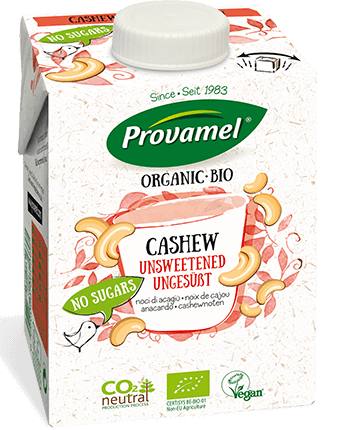 d coconut milk do. It’s also more expensive, so it’s not a particularly economic option.
d coconut milk do. It’s also more expensive, so it’s not a particularly economic option.
If you are going to go for cashew, you’ll have to watch out for added sweeteners and thickeners, so I would try and pick an organic, natural brand. I would have to turn to Provamel’s Organic Unsweetened Cashew Drink. It’s 100% organic and contains no added sugars.
My favourite recipe:
Coffee Chia Puddings
4https://www.vitamix.com/cashew-milk-benefits-and-uses
Rice Milk
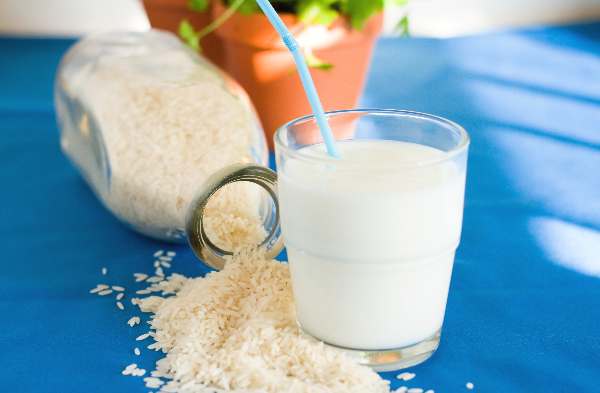
Processed from brown or white rice, rice milk has the most widespread appeal of all the non-dairy milks, ranking first as the most hypoallergenic. It’s also FODMAP-friendly making it suitable for those with IBS.
Rice milk also contains more antioxidants than any other non-dairy milk, being rich in minerals such as manganese and selenium, boosting your immune system.
In terms of calories, a typical serving will contain 120 calories, ranking it up there with dairy milk and coconut milk. However, rice milk does not contain any saturated fats or cholesterol and is a great source of B vitamins and magnesium, helping to keep you energised throughout the day – another good option for fitness fanatics!
In one study, rice milk also proved to be good for infants, especially if they have a soy or dairy allergy as it’s easily absorbed.
The downside: The downside of rice milk is that it is completely unsuitable for diabetics due to its high starch content. Similar to almond milk, cashew milk and coconut milk, rice milk is also low in protein and calcium so it may not be the best option if you are vegan or vegetarian. It also falls victim to the trend of commercial brands adding artificial thickeners and sugar substitutes so care must be taken when choosing a brand.
Is rice milk right for me? Rice milk is a valid option if you have a soy or nut allergy. It’s also gentle on your stomach so if you suffer from a digestive complaint like IBS, rice milk might be a good alternative to soy and dairy.
However, if you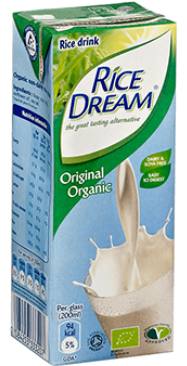 need your milk as a source of protein, you may be better going for an option such as soy. In terms of taste, rice milk is considered to have a sweet, light flavour that is comparable to milk, making it particularly effective for tea, coffee and cereal.
need your milk as a source of protein, you may be better going for an option such as soy. In terms of taste, rice milk is considered to have a sweet, light flavour that is comparable to milk, making it particularly effective for tea, coffee and cereal.
If you are determined to try rice milk, always go for an organic brand with no added sweeteners or thickeners. My personal recommendation would be Rice Dream’s Original Organic Rice Milk. It’s slightly cheaper than other rice milks on the market but it’s still 100% organic with no artificial additives – just organic rice, sunflower oil, water and a pinch of sea salt!
My favourite recipe:
Chilli Hot Chocolate





 Looking for our products in a store near you?
Looking for our products in a store near you?
